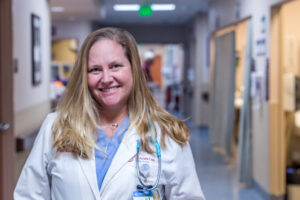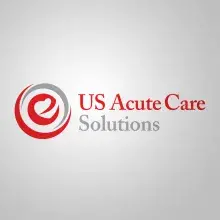USACS Physician Assistant, Arianna Campbell, PA-C, Aims to Eliminate the Stigma of Substance Use Through Education and Intervention

“A big challenge I’ve run into in the medical field is stigma and the preconceived notions about people who use drugs being a moral failure,” said Arianna. “It was causing me to lose sleep at night knowing so many of us in the medical field subconsciously treat those people differently because we assume they’re ‘bad’ when, in reality, they deserve the same respect and dignity as anyone else walking through our doors.”
Empowered by the idea of taking action rather than waiting for someone else to address an issue, a key takeaway she gathered from the USACS Scholars Program, and through an opportunity to learn more about addiction treatment, Arianna decided she would confront stigma head-on in her own emergency department.
“Substance use and addiction treatment is typically perceived as a social issue and not a medical issue, so I knew I’d have my work cut out for me,” noted Arianna. “But what I’ve found is a new perspective on medicine and a drive to not rest until we turn the opioid crisis around.”
Arianna’s unrelenting drive to make a change led her to develop a non-profit called Bridge. Since its inception in 2017, the organization’s programming has been implemented into 279 hospitals in California. They are now expanding their national footprint and have formed The Neat, which stands for The Network for Emergency Addiction Treatment, to engage more emergency departments across the US. The work Arianna has accomplished thus far through Bridge propelled her desires to continue making strides in emergency medicine addiction treatment and motivated her to pursue her master’s in public health at the number one public health school in the world, Johns Hopkins Bloomberg School of Public Health.
With only two courses left in the rigorous program, Arianna is nearing the finish line and has achieved profound success in her academic endeavors. This spring, Arianna was named the recipient of the Excellence in US Public Health Practice award from the Bloomberg School of Public Health for her practicum project which focused on reducing stigmas surrounding addiction in the emergency department.
“I began my practicum project by researching evidence behind different stigma interventions and came across research on a concept called perspective taking,” shared Arianna. “Perspective taking on its own isn’t monumental, but there was promise to it when combined with other interventions. I used this as the foundation of my quality improvement project, Bridge, which I co-authored and published alongside my team.”
Bridge utilizes a perspective taking exercise where a substance use navigator, a position Arianna designed for someone who has their own lived experiences of substance abuse, engages with a project coordinator and answers a series of questions to develop a shareable story. The project coordinator uses the navigator’s story and ties in the neurobiology of addiction to then lead a discussion with patients who are struggling with substance abuse. Once this has been completed, Arianna or a nurse member of her team sits down with the patient to discuss treatment options and how they can help them medically at their hospital.
“The idea was to incorporate perspective taking so medical personnel can identify the patient as a human being first and then relate the addiction to science which ultimately helps us understand it as a medical issue,” said Arianna. “We implemented a survey and evaluation to engage feedback from those involved in the process and received pages of positive reviews with some even saying it made a significant impact on their career outlook. I was so encouraged because I felt if this project touches even one person it’ll be worth it, and it is shaping up to be impactful in more ways than I could’ve dreamed.”
Through this project, which has been delivered 29 times and counting, Arianna and her team found an increase in naloxone distribution, a drug used to block opioid receptors in the nervous system, and an increase in the diagnosis of substance use disorders. This data leads her to believe patients are more comfortable talking about their struggles and medical personnel are more comfortable charting the disorder because they know there are steps to medically address the situation.
“Seeing these results proved to me there was an immediate and sustained difference because of this project,” said Arianna. “My capstone project will be a follow up stigma survey to compare results one-year post-implementation. My team and I have also developed an instruction guide on how to enact this stigma program so other hospitals can incorporate it into their practices.”
As for receiving the prestigious award, Arianna was honored to be nominated, let alone named the recipient, as the professor who submitted her project for consideration is one of the leading academic figures in addiction medicine. There were several stages of presentations and applications in order to make it to the final round of candidates, and Arianna’s project prevailed above the competition.
“I am still beaming at the fact that my work was seen as noteworthy to be presented to audiences beyond my fellow classmates and professors,” smiled Arianna. “Though this program has been demanding, this award proves my hard work is paying off for the greater good.”
Through the combination of seeing tangible results from her quality improvement project, expanding the outstanding work of her non-profit organization, and achieving notable academic recognition for all her efforts, Arianna is motivated to continue her pursuits for the long-term.
“This is a mission-driven project, and I am really looking forward to seeing what the future holds as I pursue my passion through this work. Stigma is prevalent, but with education and intervention we can make a change. I hope to provide medical personnel with the opportunity to shift their perspectives through proper education because every patient deserves high-quality care no matter their circumstances.”

